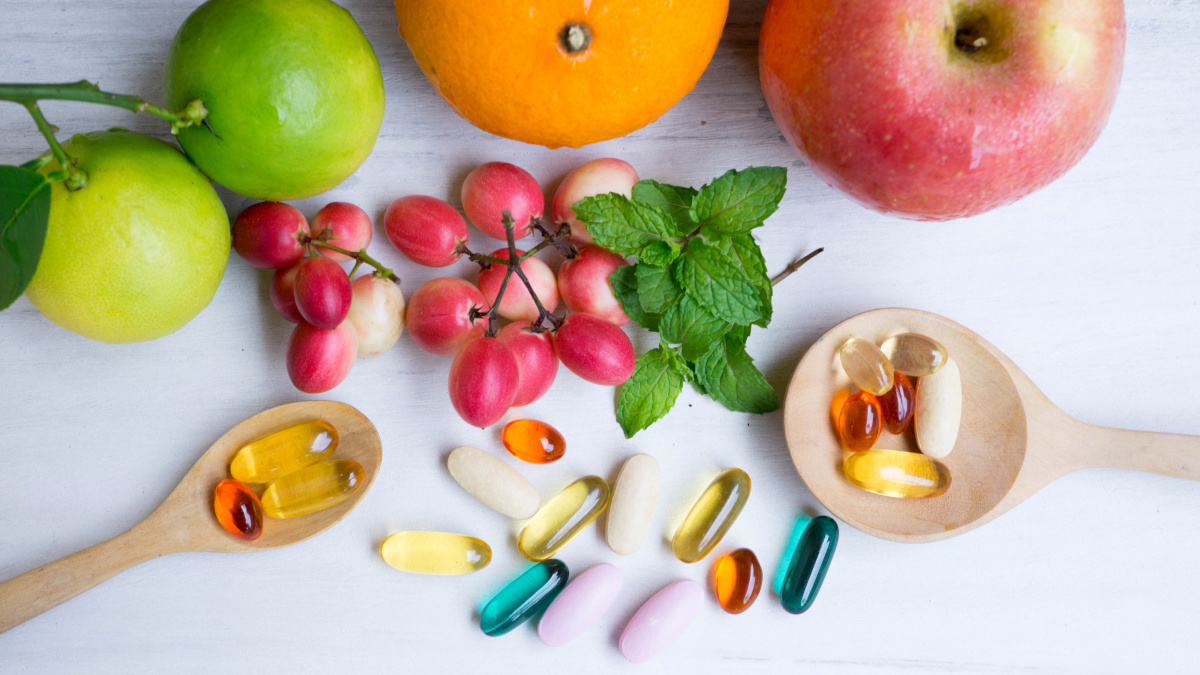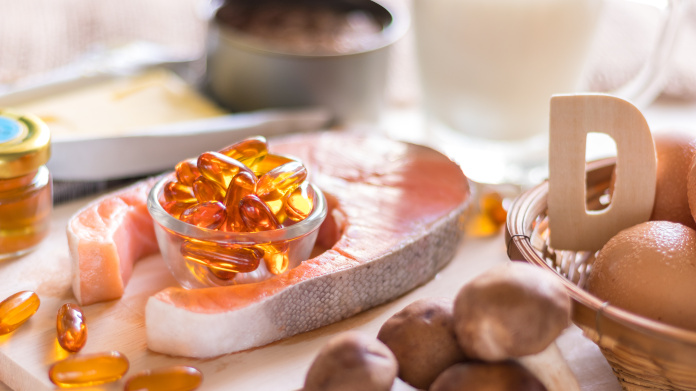
What is the best dietary supplement available?
It’s a question many of us ask but to which there’s no clear-cut answer, as supplements usually meet specific needs. Read on for our view on the subject.
A supplement for every need
At the risk of putting a dampener on things, we first have to accept that it’s impossible to create one single supplement that’s better than all the rest, one which on its own, is able to ensure good health and is suitable for all needs and situations.
The reality is that dietary supplements are designed to respond to a variety of problems:
- compensating for deficiency;
- reducing fatigue;
- delaying the effects of ageing;
- boosting resistance to winter ailments;
- relieving joint pain;
- etc.
The best ‘everyday’ supplement
There is one supplement, however, that we can agree deserves top billing. Let’s remember that, in order for all our systems to function well (the digestive, nervous, cardiovascular, and neuromuscular systems, cognitive function, metabolism, etc), our bodies need a daily supply of vitamins, minerals and trace-elements (1) :
- vitamins: A, D3, K1 and K2, B1, B2, B3, B5, B6, B12, C, E, biotin, folic acid;
- minerals and trace-elements: boron, chromium, iodine, magnesium, manganese, molybdenum, selenium, zinc;
- phytonutrients: lycopene, tocotrienols, lutein, etc.
These are known as micronutrients and phytonutrients (when they come from plants), as opposed to macronutrients (fats, carbohydrates and proteins) which provide calories and, therefore, energy.
For a good intake of these micronutrients, we need to eat ahealthy, varied and balanced diet, with sufficient fresh, raw fruits and vegetables, oily fish and other seafood, oilseeds, whole grains, etc.
To ensure a stable intake, many people choose to take a multivitamin supplement rich in minerals, trace-elements and phytonutrients especially antioxidants, such as Daily 3®, which combines 42 exceptional ingredients.
In short then, if you could only keep one single supplement, it would have to be Daily 3®.
Key supplements for supporting your health
It’s also possible to devise your own synergistic formula, in line with your particular requirements and desires, by ‘hand-picking’ what you need from among the best health-promoting supplements.
Omega-3
Essential for certain structural functions in the body, omega-3 fatty acids offer a number of benefits (2):
- ALA (a precursor of omega-3 fatty acids) helps to maintain normal cholesterol levels;
- EPA and DHA (omega-3 derivatives) support healthy heart, visual and brain function, and normal blood pressure and triglyceride levels.
These are found in oily fish and other marine-source foods, as well as in nut and rapeseed oils, watercress, cabbage and spinach, etc. But the industrialisation of modern food has completely distorted the balance of omega-3/omega-6 to the point where we now consume 10-20 times more omega-6 than omega-3, despite the World Health Organization (WHO) recommending a ratio of no more than 5:1 (3).
That’s why omega-3 supplements (such as Super Omega 3, Super EPA, Super DHA and Krill Oil) are some of the best formulations for maintaining good health.
Probiotics
Highly-popular for some years now, probiotics are defined by the WHO and FAO as “live microorganisms which, when consumed in sufficient quantities, produce a health benefit for the host”.
In fact, the rise in probiotics’ popularity was sparked by discoveries relating to the importance of the gut microbiota (or intestinal flora) for our immune system, mental health, etc.
Probiotics are dietary supplements made from the same bacterial strains as those that populate our gut microbiota (4).
That’s why many individuals keen to maintain their health take probiotic supplements such as Probio Forte or Full Spectrum Probiotic Formula, both of which are probiotic formulations containing several strains of ‘good’ bacteria.
Vitamin D
It’s a vitamin in which deficiency is particularly common in Western countries: vitamin D. A hormone essential for maintaining the balance between calcium and phosphate ions in the form of crystals, in the bones and dissolved in the blood, vitamin D:
- supports normal absorption/use of calcium and phosphorus;
- supports normal blood calcium levels;
- helps maintain healthy bones;
- helps maintain normal muscle function;
- helps maintain healthy teeth;
- supports normal immune system function;
- plays a role in the process of cell division;
- helps reduce the risk of falls associated with postural instability and muscle weakness (falls being a major risk factor for fractures in the over-60s);
- is necessary for normal bone formation and growth in children.
The body thus needs vitamin D in order to function properly and an adequate intake is essential to maintain good health.
Yet in Europe, for example, more than half of people aged over 60 are lacking in vitamin D. In countries such as France, as much as 80% of the population are vitamin D-deficient, and worldwide, more than a billion people are affected.
In short then, vitamin D is one of the best supplements to take to maintain good health (try, for example, Vitamin D3 5000 IU).
Propolis
A health secret from the beehive containing more than 300 invaluable compounds such as vitamins, essential oils, flavonoids, and minerals, propolis is one of the most important and popular substances that we get from bees. There’s no doubt it’s widely considered to be one of the best dietary supplements around (a popular choice is green propolis). It’s also frequently recommended by naturopaths (5).
The best dietary supplements for older people
Loss of appetite, calorie deficit, impaired body functions, increased oxidative reactions, bone fragility, joint strain, etc: many health problems are associated with ageing, but the fact is they are not inevitable. There are a number of supplements that can help you to age better and in some cases, combat the ageing process.
So, in addition to those previously-mentioned, supplements which are particularly suitable for seniors are synergistic formulations that:
- target bone and skeletal health, enriched with magnesium, vitamin D, zinc, and calcium, such as Super Bone Formula (which also contains bamboo tabashir extract which supports bone and joint health) (6);
- incorporate the best anti-ageing substances, working in particular, against senescent cells, and which provide coenzymes, concentrations of which decline with age (one such product is Senolytic Complex, a revolutionary formulation rich in fisetin, quercetin, etc.) (7).
The best supplements for pregnant women
Pregnancy is a challenging period for the body: the pregnant woman’s metabolism is disrupted by hormones and the foetus requires adequate nourishment for healthy development.
Which is why it’s always best to consult your doctor before starting any supplementation during pregnancy. However, in general terms, the best supplements for pregnant women are folic acid, also known as vitamin B9 (for example SuperFolate) and vitamin D (see above) (8-9).
The best supplements for nursing mothers
As is the case for pregnant women, nursing mothers should also be sure to seek medical advice before taking supplements. This is to ensure any micronutrients they wish to take are at appropriate doses which will not adversely affect their baby’s health.
That said, these are generally the best supplements for breastfeeding mothers:
- milk thistle is reputed to promote lactation, according to herbalists. Some nursing mothers therefore choose to take a milk thistle supplement (such as Silyplus) (10);
- women who breastfeed may find their calcium levels fall and therefore opt to take a calcium supplement (11).
The best supplements for sports people
Significant mineral loss through sweating, increased demand for adenosine triphosphate (ATP – energy for cells) to support sustained, intensive exercise, the need to stimulate muscle anabolism, etc: sportspeople have greater and more specific requirements than other individuals.
In addition to minerals such as zinc, magnesium and selenium, carnitine, arginine and glutamine, which boost hormones, muscle function and metabolism, there’s no doubt that the best supplements for sportspeople and for muscle-building are:
- BCAAs: branched-chain amino acids (leucine, isoleucine and valine) which support anabolic function, which are usually consumed (for example in supplement form such as the product BCAA’s) by bodybuilders after a training session, when they are directly absorbed by muscles (12) .
- creatine: a supplement with a long history of study and use by sportspeople, creatine is a precursor of ATP, and thus provides more energy for longer. Here, the idea is to saturate the muscles with creatine (for example, by taking the supplement 3-Creatine) for a period of 1-2 weeks, and then maintain this saturation with a daily dose of 3g-5g (13).
References
- GODSWILL, Awuchi Godswill, SOMTOCHUKWU, Igwe Victory, IKECHUKWU, Amagwula O., et al.Health benefits of micronutrients (vitamins and minerals) and their associated deficiency diseases: A systematic review. International Journal of Food Sciences, 2020, vol. 3, no 1, p. 1-32.
- https://www.anses.fr/fr/content/les-lipides
- CANDELA, C. Gómez, LÓPEZ, LMa Bermejo, et KOHEN, V. Loria. Importance of a balanced omega 6/omega 3 ratio for the maintenance of health. Nutritional recommendations. Nutricion hospitalaria, 2011, vol. 26, no 2, p. 323-329.
- BOCLÉ, J. C. et THOMANN, C. Effects of probiotics and prebiotics on flora and immunity in adults. L'Agence Française de Sécurité Sanitaire des Aliments report. L'Agence Française de Sécurité Sanitaire des Aliments, Maisons-Alfort, France, 2005, p. 59-128.
- BRAAKHUIS, Andrea. Evidence on the health benefits of supplemental propolis. Nutrients, 2019, vol. 11, no 11, p. 2705.
- ABDURRAHMAN, Samar Zakir et ANWAR, Mohd. Ethno medicinal, phyto chemical and therapeutic importance of Bambusa arundinaceous: A review.
- MAHER, Pamela. Modulation of multiple pathways involved in the maintenance of neuronal function during aging by fisetin. Genes & nutrition, 2009, vol. 4, no 4, p. 297.
- RASMUSSEN, Mikkel Mylius, CLEMMENSEN, Dorte, et al.Folic acid supplementation in pregnant women. Dan Med Bull, 2010, vol. 57, no 1, p. A4134.
- WEI, Shu Qin. Vitamin D and pregnancy outcomes. Current Opinion in Obstetrics and Gynecology, 2014, vol. 26, no 6, p. 438-447.
- JIANG, XiaoJun, LIN, Sen, LIN, Yan, et al.Effects of silymarin supplementation during transition and lactation on reproductive performance, milk composition and haematological parameters in sows. Journal of Animal Physiology and Animal Nutrition, 2020, vol. 104, no 6, p. 1896-1903.
- PRENTICE, Ann, et al.Calcium in pregnancy and lactation. Annual review of nutrition, 2000, vol. 20, no 1, p. 249-272.
- DE LORENZO, A., PETRONI, M. L., MASALA, S., et al.Effect of acute and chronic branched-chain amino acids on energy metabolism and muscle performance. Diabetes, nutrition & metabolism, 2003, vol. 16, no 5-6, p. 291-297.
- FRANCAUX, Marc et POORTMANS, J. R. Effects of training and creatine supplement on muscle strength and body mass. European journal of applied physiology and occupational physiology, 1999, vol. 80, no 2, p. 165-168.
Keywords
1 Days
Great service
Great service items dispatched straight away and arrived on time
M***** G***
5 Days
A good webshop for supplements
A good webshop for supplements, it has a large selection of them and considering the quality, the pricing offers good value for money. The ordering process is easy and the products are sent straight away.
Maurice
7 Days
Great quality
Products are of great quality and fast delivered.
Fred Laan
8 Days
SuperSmart destaca por la calidad de…
SuperSmart destaca por la calidad de sus productos.
GONZALEZ PALACIN Luis
9 Days
snelle levering,perfect product.
snelle levering,perfect product.
robert
9 Days
Been a customer for over 15 years and…
Been a customer for over 15 years and find their products along with the service excellent. I recommend Super Smart to all my friends.
Del Chandler
10 Days
Excellent product and service
The product was excellent and so were the delivery and the service
F. Ferlitz
12 Days
Never an issue ordering
Never an issue ordering. Simple and to the point. And product always comes the following day. Quality is great too!
Andrea
13 Days
Excellente service & products with rare…
Excellente service & products with rare revelation supplements I love ❤️
Giovanna Escalera
14 Days
Fast shipping
Fast shipping, products as ordered!
Coindozer
14 Days
The item arrived on time and is what…
The item arrived on time and is what was stated in the order.
HARDY Chris
17 Days
Very good products
Very good products. Very reliable. Quick delivery.
MIFSUD Joseph
21 Days
Fast shipping
Fast shipping, good products (just shipping costs to my country are extremely high).
Tanja Matko
21 Days
Many thanks.
Many thanks.
Alan
22 Days
Quick delivery and good product
Quick delivery and good product
cl



